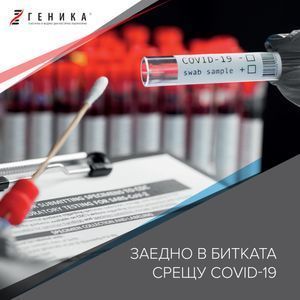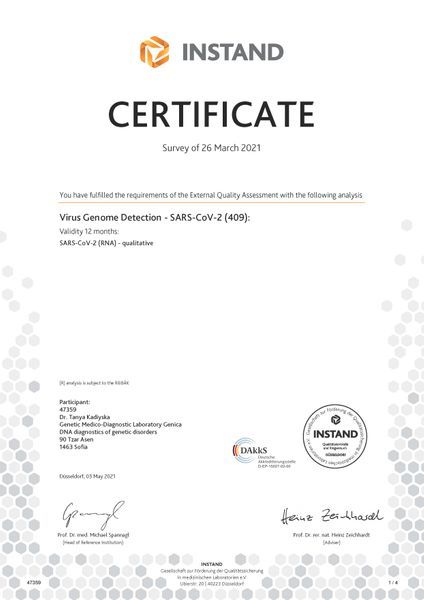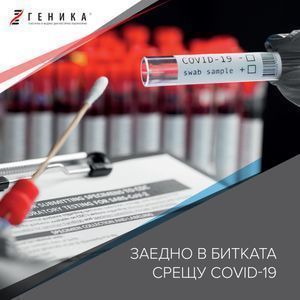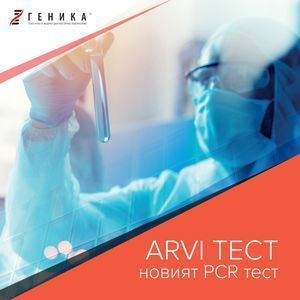COVID-19 PCR
The RT-PCR test for COVID-19 is the global standard for diagnosing coronavirus. This is a molecular genetic test that uses a technique to amplify small, SARS-CoV-2-specific DNA fragments. It can be used to determine whether the test material contains genetic material of the virus, even in small quantities. The test is performed on nasopharyngeal and oropharyngeal sample (nasal and throat sample).
The PCR test is the earliest diagnostic marker for COVID-19. It detects the pathogen in subclinical or asymptomatic forms, even before the virus carrier is able to transmit the infection to others. By extracting the carrier of genetic information (RNA) of the virus and subsequent detection by RT-PCR of several genes, unique and specific for SARS-CoV-2, GENICA Lab delivers results of a PCR test using the highest-class laboratory analysis. GENICA’s RT-PCR test for SARS-CoV-2 meets the high analytical criteria for а genetic laboratory. It detects highly sensitive unique genes, specific only for this virus, guaranteeing the accuracy and precision of the results.
GENICA holds INSTAND E.V. certificate for international quality of laboratory diagnostics for SARS-CoV-2.
Diagnostic Range: SARS-CoV-2
Diagnostic Method: RT-PCR assay
Research Material: Nasopharyngeal and oropharyngeal specimens
Results within: Same day results for all COVID-19 PCR tests and immunological tests for SARS-CoV-2 antibodies. Test results for antigen analysis are issued within 1 hour after sample collection.
Fee: COVID-19 PCR Individual - BGN 80; COVID-19 PCR Family Package - BGN 75 per patient; COVID-19 PCR 2+ Group Package - BGN 75 per patient.
Clinical application
Diseases associated with SARS-CoV-2
Download Our Brochure
Download Our Brochure
COVID-19 Antigen Test
COVID-19 antigen assays look for the antigen in the virus envelope protein. These tests are faster than PCR diagnostics but have lower sensitivity and specificity than the PCR test, because they do not multiply the in-vitro viral antigen (as in the PCR method) but detect the actual viral amount in the sample. Due to the lack of viral replication the rapid antigen test is applicable to patients with a high viral load. These tests are a good screening choice for patients with symptoms. The best time for testing is about a week after possible risky contact with a positive patient or during the first week of clinical symptoms. A negative result does not rule out the possibility of COVID-19 infection and should be interpreted in conjunction with the clinical picture, patient history, and epidemiological information. In case of clinical and epidemiological data, regardless of the negative result of the rapid antigen test, PCR must be performed.
Diagnostic Range: SARS-CoV-2
Diagnostic Method: Viral capsid detection
Research Material: Nasopharyngeal and oropharyngeal specimens
Results within: 1 hour
Fee: BGN 15
Clinical application
Diseases associated with SARS-CoV-2
Download Our Brochure
Download Our Brochure
COVID-19 + Influenza A and Influenza B (PCR Test)
This test offers simultaneous testing for COVID-19, influenza A and influenza B with a single sample of nasopharyngeal or oropharyngeal specimen (nasal or throat sample). The technology is the same as in the RT-PCR tests for COVID-19. It differs in that there are several different primer and fluorescent probes specifically targeted at: influenza virus matrix protein type A (Flu A), influenza virus type B matrix protein (Flu B), and nucleocapsid gene N of SARS-CoV-2 virus.
This type of test is recommended by the WHO for the specific diagnosis and differentiation of the three viruses as causes of acute respiratory disorders with similar symptoms but with different causes and different treatments.
Diagnostic Range: SARS-CoV-2; Influenza A; Influenza B
Diagnostic Method: RT-PCR Assay
Research Material: Nasopharyngeal and oropharyngeal specimens
Results within: For samples taken before 1.00 p.m. - the same day. For samples taken after 1.00 p.m. – before 2.00 p.m. the next business day.
Fee: BGN 135
Clinical application
SARS-CoV-2; Influenza A; Influenza B
COVID-19 + Influenza A and Influenza B + RSV (PCR Test)
This test offers simultaneous testing for COVID-19, influenza A, influenza B and respiratory syncytial virus (RSV) with a single sample of nasopharyngeal or oropharyngeal specimen (nasal or throat sample). The technology is the same as in the RT-PCR tests for COVID-19. It differs in that there are several different primer and fluorescent probes specifically targeted at: influenza virus matrix protein type A (Flu A), influenza virus type B matrix protein (Flu B), RSV and nucleocapsid gene N of SARS-CoV-2 virus.
These types of tests are recommended by the WHO for the specific diagnosis and differentiation of the four viruses as causes of acute respiratory disorders with similar symptoms but with different causes and different treatments.
Diagnostic Range: SARS-CoV-2; Influenza A; Influenza B; RSV
Diagnostic Method: RT-PCR Assay
Research Material: Nasopharyngeal and oropharyngeal specimens
Results within: For samples taken before 1.00 p.m. - the same day. For samples taken after 1.00 p.m. – before 2.00 p.m. the next business day.
Fee: BGN 140
Clinical application
COVID-19, influenza A and influenza B, non-influenza acute respiratory infections
ARVI Screen 18®
PCR test for simultaneous detection of 18 pathogens associated with acute respiratory viral infections. It includes testing for the new coronavirus, the two influenza and 15 non-influenza viruses.
The test detects a number of respiratory viruses associated with influenza and non-influenza respiratory infections, distinguishing them from SARS-CoV-2, that causes COVID-19. In addition to SARS-CoV-2, influenza virus type B and three separate strains of influenza virus type A, the test detects four other coronaviruses, human metapneumovirus, human rhinovirus, adenovirus, bocavirus, parainfluenza virus, respiratory syncytial virus (RSV).
The test results provide information to the physician about the type of pathogen that causes the respiratory disease (viral, bacterial, or mixed etiology). This allows for an informed assessment of the therapeutic approach for the patient - for example, the need for anti-influenza drugs, antibiotics or only symptomatic treatment and more.
Diagnostic Range: SARS-CoV-2; Influenza A; Influenza B; Human Respiratory Syncytial virus (hRSv); Human Metapneumovirus (hMpv); Human Parainfluenza virus-1-4 (hPiv); ОС43, Е229, NL63, HKUI human Coronavirus (hCov); Human Rhinovirus (hRv); Human B, C, E Adenovirus (hAdv); Human Bocavirus (hBov)
Diagnostic Method: PCR Assay
Research Material: Nasopharyngeal and oropharyngeal specimens
Results within: Up to 24 hours
Fee: BGN 140
ARVI Screen 22®
This is PCR test for simultaneous detection of 22 pathogens associated with acute respiratory viral infections. It includes testing for the new coronavirus, the two influenza and 19 non-influenza viruses, covering all possible respiratory viral pathogens.
ARVI screen 22® detects a number of respiratory viruses associated with influenza and non-influenza respiratory infections, distinguishing them from SARS-CoV-2, that causes COVID-19. In addition to SARS-CoV-2, influenza virus type B and three separate strains of influenza virus type A, the test detects four other coronaviruses, human metapneumovirus, human rhinovirus, adenovirus, bocavirus, parainfluenza virus, respiratory syncytial virus (RSV), parechovirus and paramyxovirus.
The test results provide information to the physician about the type of pathogen that causes the respiratory disease (viral, bacterial, or mixed etiology). This allows for an informed assessment of the therapeutic approach for the patient - for example, the need for anti-influenza drugs, antibiotics, or only symptomatic treatment and more.
Diagnostic Range: SARS-CoV-2; Influenza A; Influenza B; Human Respiratory Syncytial virus (hRSv); Human Metapneumovirus (hMpv); Human Parainfluenza virus-1-4 (hPiv); ОС43, Е229, NL63, HKUI human; Coronavirus (hCov); Human Rhinovirus (hRv); Human B, C, E Adenovirus (hAdv); Human Bocavirus (hBov); Enterovirus (EV); Parechovirus (HPeV); Paramyxoviridae (HPIV)
Diagnostic Method: PCR Assay
Research Material: Nasopharyngeal and oropharyngeal specimens
Results within: Up to 48 hours
Fee: BGN 190
Bacterial Respiratory Panel PCR
The test is intended for patients with symptoms of acute respiratory infection with suspected bacterial or mixed viral and bacterial etiology.
The test results provide information to the physician about the type of pathogen that causes the respiratory. This allows for an informed assessment of the therapeutic approach for the patient - for example, the need for anti-influenza drugs, antibiotics, or only symptomatic treatment and more.
Diagnostic Range: Mycoplasma pneumoniae; Chlamydophila pneumoniae; Legionella pneumophila; Haemophilus influenzae; Streptococcus pneumoniae; Staphylococcus aureus; Moraxella catarrhalis
Diagnostic Method: PCR Assay
Research Material: Nasopharyngeal and oropharyngeal specimens; Sputum
Results within: Up tp 24 hours
Fee: BGN 95
Clinical application
Acute respiratory bacterial infections; Bacterial pneumonia
Mucoviscidosis / Cystic Fibrosis
Mucoviscidosis / Cystic fibrosis is an inherited, incurable disease with a high incidence among Caucasians. It is due to mutations in the CFTR gene, which leads to disruption of chloride channels on the secretory glands. As a result, excessively thick and sticky mucus is retained and accumulated, that is a favorable environment for the development of pathogenic microorganisms and for frequent infections. Many systems and organs are affected - most often the lungs and the digestive system.
Symptoms may occur before birth (with ultrasound evidence of hyperechogenic intestinal loops in the fetus), after birth (the most common indication is meconium ileus), or in early childhood (with frequent severe lung infections and slow weight gain). The treatment is supportive, and the hope in some cases is in a lung transplant. The average life expectancy of the affected patients is between 12 and 30 years.
The frequency of mutations in the CFTR gene among the Bulgarian population is estimated at 1 in 30 (or about 200,000 persons in the country), and every year an average of 20 children are born affected by this incurable disease.
The risk of giving birth to a child affected by cystic fibrosis in a family with both partners carriers is 25%. The only prevention is search for carriers and prenatal diagnostics.
Diagnostic Range: CFTR
Diagnostic Method: Sanger sequencing to search for point mutations and small deletions in the CFTR gene; MLPA to search for deletions of exons of the CFTR gene
Research Material: Venous blood with K2EDTA (purple tube)
Results within: 10 business days
Fee: BGN 600 - Sanger sequencing to search for the most common CFTR mutations in Bulgaria; BGN 2,600 - Sanger sequencing of the entire CFTR gene; BGN 800 - MLPA
Clinical application
Confirmation of the clinical diagnosis; Carrier testing in unaffected family members




_Page_1_600x600.jpg?alt=media)
